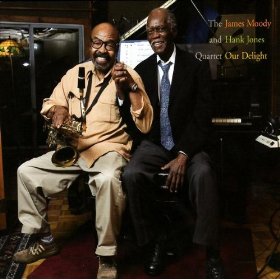This is a sweet new release for various reasons: Foremost is the companionship displayed by two old masters-Jones and Moody. Both have been around the block (and Jones has outlived his talented younger brothers Thad and Elvin). Second, the structure of the performance is commendable. They focus on the compositions of two legendary figures: Tadd "Tadley Ewing Peake" Dameron and Dizzy "John Birks" Gillespie. Of the twelve pieces, seven were penned by Dameron and Gillespie. Moreover, the pieces are still played but not as reflective of their original appearance in the jazz repertoire as they are in this package.
They begin with Dameron's "Tadd's Delight" (aka "Sid's Delight"), which becomes "Our Delight" in the hands of Jones and Moody and also serves as the eponymous title. With this opening, it immediately becomes discernible that this piece has become a standard for today's musicians, and the knowledge increases with each piece. One can identify strains of this music in so much current improvisation. At any rate, they build on this piece by playing Gillespie's "Birks' Works," which epitomizes jazz cool. The music can be bluesy at times, but mainly it soars gracefully. Hank Jones' approach is revealed from the start with this piece: the ideal accompanist but one who displays a unique sound and style in his own solo improvisations. The rest of the band comes together nicely and, if "Our Delight" did not capture the listener's undivided attention, from this point each selection is anticipated.
Anticipation notwithstanding, this music makes a music lover work, which is a good thing. 'Lady Bird" and 'Good Bait' are classic Dameron pieces, pieces that Parker and Gillespie have recorded many times. These pieces bring to mind a Dameron composition not showcased on this release, "Hot House," that is often attributed to Parker. "Good Bait" was written when Dameron was working with Basie, who occasionally, as on this release, is given partial credit. And 'Lady Bird" is so much fun to listen to and, obviously, to play. The final Dameron piece is "Soul Trane," which is a lovely piece, seemingly created for a saxophone. Haunting. Yet, Jones displayed such a touch; he shows me something the more I listen to him. There is so much good music here: Gillespie's "Con Alma" and "Woody 'N You"; Moody using his flute to sing the Robinson and Hill chestnut "Old Folks"; or Moody's little classic "Darben the Red Foxx."
One minor complaint: The last selection is a Jimmy Heath composition, "Moody's Groove"; and the guys in the band are joined by Roberta Gambarini. It's a nice song; she sings it well. Good that it comes at the end so that it does not ruin the rhythm and overall excellent structure of the rest of the program. Up until that point, it was Moody and Jones. Perhaps all involved should have taken a page from Jones' book, that one about grace and hubris.
In the end, one thing is important: the music is worth collecting.

